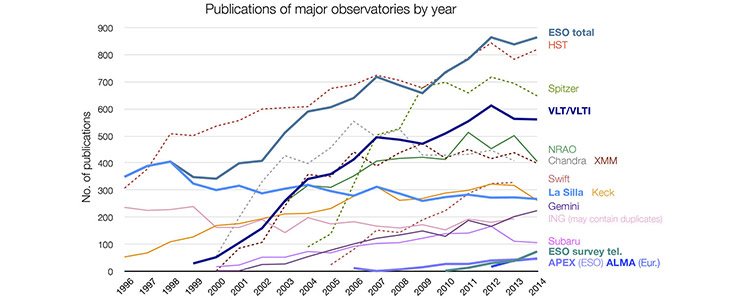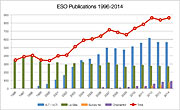Annuncio
L'ESO si conferma l'Osservatorio da terra più produttivo al Mondo
05 Marzo 2015
Un'indagine sul numero di articoli scientifici sottoposti a referaggio e pubblicati nel 2014 usando dati da telescopi e strumenti dell'ESO ha dimostrato che l'ESO rimane l'osservatorio da terra più produttivo al mondo. L'anno scorso gli astronomi hanno utilizzato le osservazioni provenienti dalle strutture dell'ESO per produrre 864 articoli con referaggio, raggiungendo il numero record del 2012. Il numero di articoli pubblicati nel 2014 a partire dai dati dell'ESO è rimasto leggermente più alto delle pubblicazioni basate sui dati provenienti dal telescopio spaziale Hubble della NASA/ESA.
Quasi il 65% di tutti gli articoli accreditati all'ESO nel 2014 si basa sui dati ottenuti con il Very Large Telescope (VLT) o con l'interferometro del VLT (VLTI). Gli strumenti più produttivi in termini di articoli sono UVES e FORS2, mentre il terzo posto va a VIMOS. I dati sono molto positivi anche per GIRAFFE e SINFONI.
Il telescopio VISTA, che si trova al Paranal, ha fornito dati per quasi il doppio degli articoli rispetto al 2013. Anche FEROS, SOFI e WFI registrano un aumento, mentre HARPS rimane lo strumento più produttivo all'Osservatorio di La Silla. Le strutture di La Silla hanno fornito dati per un totale di più di 260 articoli.
Il numero complessivo di articoli basati sul tempo di osservazione europeo al telescopio ALMA (Atacama Large Millimeter/submillimeter Array) è salito notevolmente, fino a un totale di 104 alla fine del 2014.
Il telescopio APEX (Atacama Pathfinder Experiment telescope), gestito dall'ESO sull'altopiano di Chajnantor, nella regione cilena di Atacama — una collaborazione tra l'Istituto Max Planck di Radioastronomia, l'Onsala Space Observatory e l'ESO — ha registrato un lieve aumento nelle pubblicazioni dell'ESO a partire dall'anno scorso, con più della metà di tutti gli articoli pubblicati provenienti dal tempo di osservazione dell'ESO.
I metodi usati per ottenere questi numeri variano a seconda dei diversi osservatori, quindi le cifre non possono essere sempre paragonate con precisione. Tuttavia, l'ESO continua a sorpassare in modo significativo ogni altro osservatorio da terra, rimanendo leggermente al di sopra del telescopio spaziale Hubble della NASA/ESA. Questi risultati sottolineano il grande contributo dell'ESO alla ricerca astronomica: le statistiche in merito alle pubblicazioni danno un'idea di quanto lavoro scientifico sia portato a termine a partire dai dati dei singoli osservatori ma non mostrano il forte impatto che questi hanno sulla scienza.
Le cifre vengono pubblicate nelle Basic ESO Publication Statistics [1] diffuse dalla Biblioteca dell'ESO e calcolate usando la ESO Telescope Bibliography (telbib), un database che contiene pubblicazioni con referaggio che utilizzano dati dell'ESO [2]. L'ESO compie notevoli sforzi per identificare tutti questi articoli e considera telbib sostanzialmente completo.
Sono anche disponibili online grafici interattivi di statistiche specifiche. Questi grafici mostrano l'intero contenuto del database telbib [3], che conserva i documenti relativi alle pubblicazioni dal 1996 a oggi. I documenti possono essere usati per esplorare diversi aspetti della storia delle pubblicazioni, compreso lo sviluppo degli articoli scientifici nati dagli strumenti dell'ESO e l'uso di dati d'archivio.
Note
[1] Basic ESO Publication Statistics
[2] Informazioni su telbib e accesso al database
[3] Statistiche interattive del database telbib
Contatti
Uta Grothkopf
ESO Librarian
Garching bei München, Germania
Tel: +49 89 3200 6280
Email: uta.grothkopf@eso.org
Richard Hook
ESO Public Information Officer
Garching bei München, Germania
Tel: +49 89 3200 6655
Cell: +49 151 1537 3591
Email: rhook@eso.org
A proposito dell'annuncio
| Identificazione: | ann15014 |
Our use of Cookies
We use cookies that are essential for accessing our websites and using our services. We also use cookies to analyse, measure and improve our websites’ performance, to enable content sharing via social media and to display media content hosted on third-party platforms.
ESO Cookies Policy
The European Organisation for Astronomical Research in the Southern Hemisphere (ESO) is the pre-eminent intergovernmental science and technology organisation in astronomy. It carries out an ambitious programme focused on the design, construction and operation of powerful ground-based observing facilities for astronomy.
This Cookies Policy is intended to provide clarity by outlining the cookies used on the ESO public websites, their functions, the options you have for controlling them, and the ways you can contact us for additional details.
What are cookies?
Cookies are small pieces of data stored on your device by websites you visit. They serve various purposes, such as remembering login credentials and preferences and enhance your browsing experience.
Categories of cookies we use
Essential cookies (always active): These cookies are strictly necessary for the proper functioning of our website. Without these cookies, the website cannot operate correctly, and certain services, such as logging in or accessing secure areas, may not be available; because they are essential for the website’s operation, they cannot be disabled.
Functional Cookies: These cookies enhance your browsing experience by enabling additional features and personalization, such as remembering your preferences and settings. While not strictly necessary for the website to function, they improve usability and convenience; these cookies are only placed if you provide your consent.
Analytics cookies: These cookies collect information about how visitors interact with our website, such as which pages are visited most often and how users navigate the site. This data helps us improve website performance, optimize content, and enhance the user experience; these cookies are only placed if you provide your consent. We use the following analytics cookies.
Matomo Cookies:
This website uses Matomo (formerly Piwik), an open source software which enables the statistical analysis of website visits. Matomo uses cookies (text files) which are saved on your computer and which allow us to analyze how you use our website. The website user information generated by the cookies will only be saved on the servers of our IT Department. We use this information to analyze www.eso.org visits and to prepare reports on website activities. These data will not be disclosed to third parties.
On behalf of ESO, Matomo will use this information for the purpose of evaluating your use of the website, compiling reports on website activity and providing other services relating to website activity and internet usage.
Matomo cookies settings:
Additional Third-party cookies on ESO websites: some of our pages display content from external providers, e.g. YouTube.
Such third-party services are outside of ESO control and may, at any time, change their terms of service, use of cookies, etc.
YouTube: Some videos on the ESO website are embedded from ESO’s official YouTube channel. We have enabled YouTube’s privacy-enhanced mode, meaning that no cookies are set unless the user actively clicks on the video to play it. Additionally, in this mode, YouTube does not store any personally identifiable cookie data for embedded video playbacks. For more details, please refer to YouTube’s embedding videos information page.
Cookies can also be classified based on the following elements.
Regarding the domain, there are:
- First-party cookies, set by the website you are currently visiting. They are stored by the same domain that you are browsing and are used to enhance your experience on that site;
- Third-party cookies, set by a domain other than the one you are currently visiting.
As for their duration, cookies can be:
- Browser-session cookies, which are deleted when the user closes the browser;
- Stored cookies, which stay on the user's device for a predetermined period of time.
How to manage cookies
Cookie settings: You can modify your cookie choices for the ESO webpages at any time by clicking on the link Cookie settings at the bottom of any page.
In your browser: If you wish to delete cookies or instruct your browser to delete or block cookies by default, please visit the help pages of your browser:
Please be aware that if you delete or decline cookies, certain functionalities of our website may be not be available and your browsing experience may be affected.
You can set most browsers to prevent any cookies being placed on your device, but you may then have to manually adjust some preferences every time you visit a site/page. And some services and functionalities may not work properly at all (e.g. profile logging-in, shop check out).
Updates to the ESO Cookies Policy
The ESO Cookies Policy may be subject to future updates, which will be made available on this page.
Additional information
For any queries related to cookies, please contact: pdprATesoDOTorg.
As ESO public webpages are managed by our Department of Communication, your questions will be dealt with the support of the said Department.


